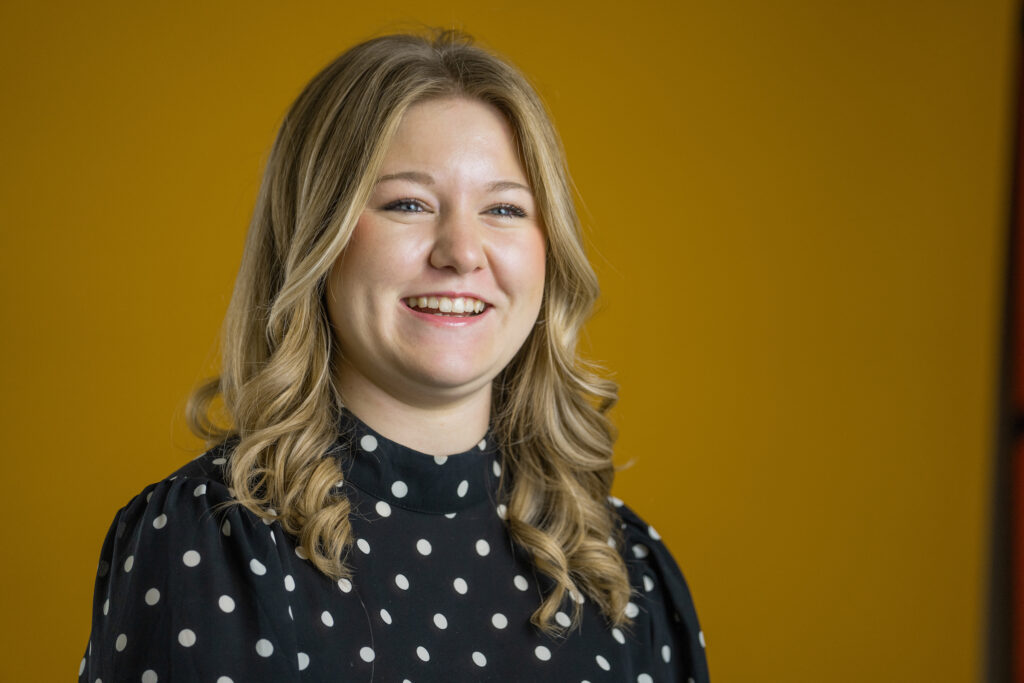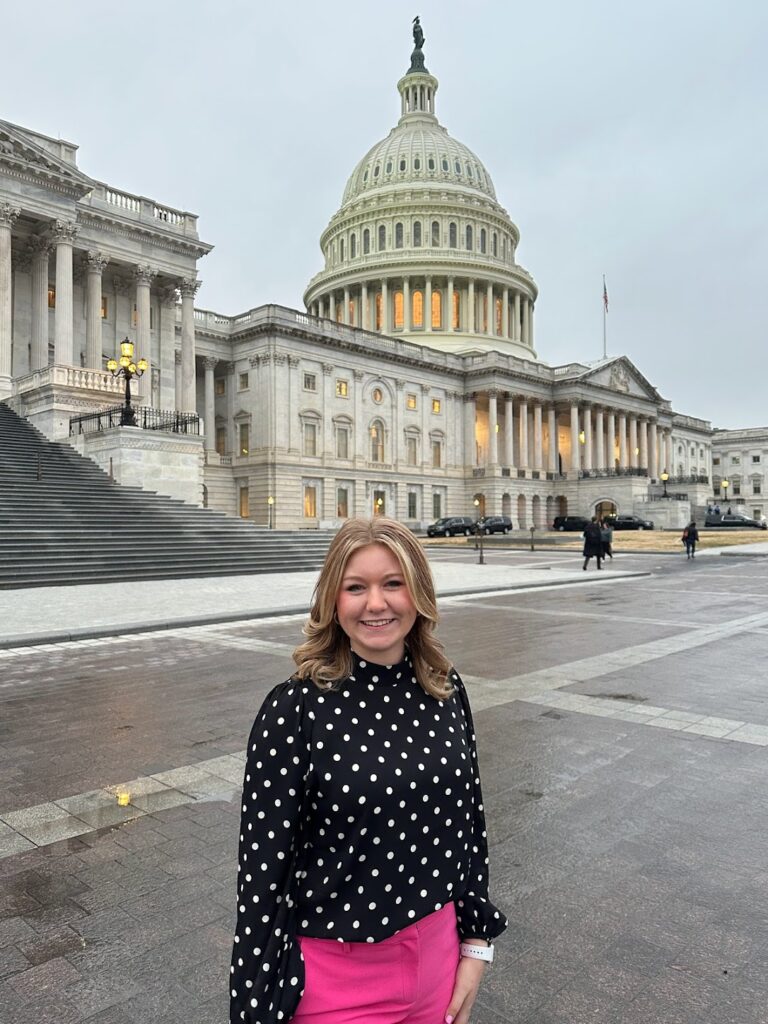Switching majors leads to agricultural leadership and development
Presley Wirebaugh ’24 shares her academic journey of change and experience
Getting to college with preconceived notions of what you want to study or where you are headed doesn’t mean you have to stick to that plan. A recent graduate, Presley Wirebaugh ’24, shows how taking chances can lead to the right path.

Wirebaugh started her academic journey as an animal science major, but she recently completed that journey in the Texas A&M College of Agriculture and Life Sciences Department of Agricultural Leadership, Education and Communications.
As a recent graduate, she reflects on her time at Texas A&M University.
Despite beginning her college journey during the pandemic, Wirebaugh jumped in headfirst and made the most of her four years on campus, fully immersing herself in student life. She served as a College student ambassador within her department and engaged with student organizations such as Aggie ALEC Reps and the professional agricultural sorority, Aggie Sigma Alpha, among others.
Drawing on her past experiences and mentorships from her involvement in the Texas A&M AgriLife Extension Service’s Texas 4-H youth program, she decided to deeply engage herself in campus life through these student organizations. Eventually, she leveraged her background to become part of the Grow Texas program.
After many on-campus events, walks to class and days as a student worker, the sun has finally set on Wirebaugh’s college career. She sat down to share her personal experience studying within the College, her involvement across campus and community as well as her plans for a future beyond graduation.
Why did you choose to pursue a degree in agricultural leadership and development?
My transition to college was unconventional, to say the least. I started during COVID, and it was an adjustment coming to college. I started as an animal science major and thought that was what I wanted to do. Once I got to campus, I started hearing about different majors. I quickly learned about leadership and development, and it piqued my interest. As it turns out, both of my aunts also graduated with the same degree, which re-affirmed the great things I’d heard about the major.
So, I decided to switch and just give it a try. It has been an enriching experience, connecting with numerous exceptional faculty members and other fellow students who share my interests and goals. I have had the opportunity to network with industry professionals in agriculture and delve into leadership theories that will undoubtedly shape my career path.
How do you feel your major has shaped your post-graduation path?
So far, my major has significantly influenced my potential career trajectory. For instance, I stumbled upon an opportunity with the Agricultural and Natural Resources Policy Internship Program, ANRP. A couple of my professors mentioned the course to me, which resonated with my existing interest in agricultural policy. I was eager to explore how I could align my major with a career in agricultural policy, so I decided to apply. Before I knew it, I found myself in Washington, D.C., interning on Capitol Hill for five months.
It was a life-changing experience for me to work hands-on with policy every day, meet so many excellent constituents and learn from industry professionals all through my major and through the College. It was truly unique. I saw how I could use everything I was learning in my major-specific courses, from ethics to leadership theory to all the amazing networking skills they teach you within the department and my agricultural communications minor. I needed and used every one of those skills during my internship. Being able to tie it all back and connect it to my college education showed me the value of earning my degree in agricultural leadership and development.
What are your plans after graduation?
I was recently accepted to the Bush School of Government and Public Service where I will be pursuing a Master’s in Public Service and Administration next fall.
I want to connect agriculture to policy and help consumers know where their food and clothes come from. As the world population continues growing, the agricultural industry must grow too. This opportunity is one that I know will propel me even further towards making a change in that realm.
Tell us about your decision to minor in horticulture.
I added a minor in horticulture last fall semester after taking the HORT 203 Floral Design course. I was really interested in plants and their effects on people. It has been fascinating to learn about how closely connected they are with our well-being. I had grown up around the animal side of agriculture, but I needed to tap into the horticulture and plant aspects of agriculture fully.
Learning more about how things grow and how plants positively affect people has also been awesome. From learning about floral design to winemaking, adding this minor has become another rewarding part of my college career. Since I am pursuing a career in agricultural policy, this experience has taught me that I can also advocate for agriculture within the horticultural sector. Explaining industry practices and advocating for the wine industry in Texas, which is also booming, is another one of my interests. Being able to talk about and have a good knowledge base of both plant and animal agriculture will, I think, benefit me in a career in agricultural policy.

Tell us more about your experience in the ANRP program.
During my internship on Capitol Hill, I got to go to the U.S. House of Representatives every day and give tours of our nation’s capitol, which was incredible. Being involved in the ANRP program improved my public speaking skills and professionalism.
I worked with Congressman Chip Roy, who is my hometown representative for New Braunfels. I also got to work with some amazing staff members while I was up there, from the chief of staff to my staff assistant, who was the intern coordinator. She was amazing and a great mentor to me.
I responded to constituent correspondence by writing letters, answering the phones and serving anyone who called the office and asked questions. I also had the chance to attend a meeting with the Texas Farm Bureau when they came to Washington, D.C., on behalf of the congressman. As I sat in on that meeting, I helped plan his question-and-answer session, address their needs and figure out what people may be wondering about back home.
Having experiences like that during my internship became lightbulb moments for me. They turned on that light in my head that this is the answer to what I want to do when I grow up. The entire experience is one I am thankful to the program for.
What can you tell us about your time as a student worker in the Grow Texas program?
I heard about this program through Dr. Julie Gardner, who has been a great mentor and resource for me throughout my 4-H career and now into college. She introduced me to this program and how we’d be teaching kids from around the state about horticulture, healthy lifestyles and healthy eating.
As a student worker for the Grow Texas program, I have learned more about how healthy lifestyles and horticulture are interconnected. I worked with and taught incredible youth across Texas, and I have also learned what it takes to execute and facilitate large events, develop social media management skills and grow in my public speaking skills.
But my biggest takeaway was seeing the impact we make across the state through this program. Hearing our influence on these students throughout their high school years has been really rewarding.
Tell us about an experience as a current student that impacted your college or future career
One of the things that has had a significant impact on my college career was being a part of the Animal Science 117 Texas Barbecue class.
While many might think that the course only covers barbecue science, that is not actually the case. This class turned out to be so much more and became more of a family for me. It’s something I look forward to every week.
The course brings together freshmen in their first semester of college and has them learn about barbecue, and also eat it. But the genuine part is the networking and mentoring within the class. I was a sophomore when I joined the course due to the COVID year, but I am beyond glad I was still able to participate.
I also decided to give back and return as a jazzy junior and snazzy senior, as they call them, as a mentor in the class. I got to talk to other first-semester freshmen to provide insight into my experiences and became a friend and a mentor to them. Overall, this class impacted my time in the College and made me realize how unique and lucky we are to attend school here.
What advice would you give prospective students?
My advice for prospective students would be to put yourself out there and take part in every opportunity in the College. Even though I’ve just graduated, there are still things that I know I would love to have done if only I had known about them sooner. Know that there are so many opportunities here. Faculty and staff really care about you and want to support you. Take part in those opportunities and get out there; it can be as simple as going up to your professor on the first day of class and committing to opening that door.





